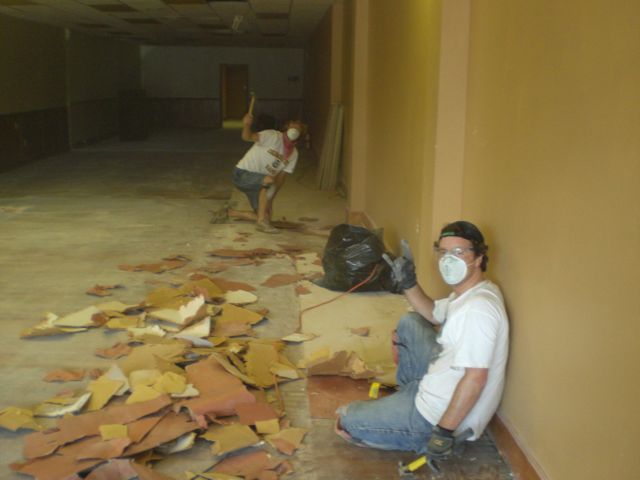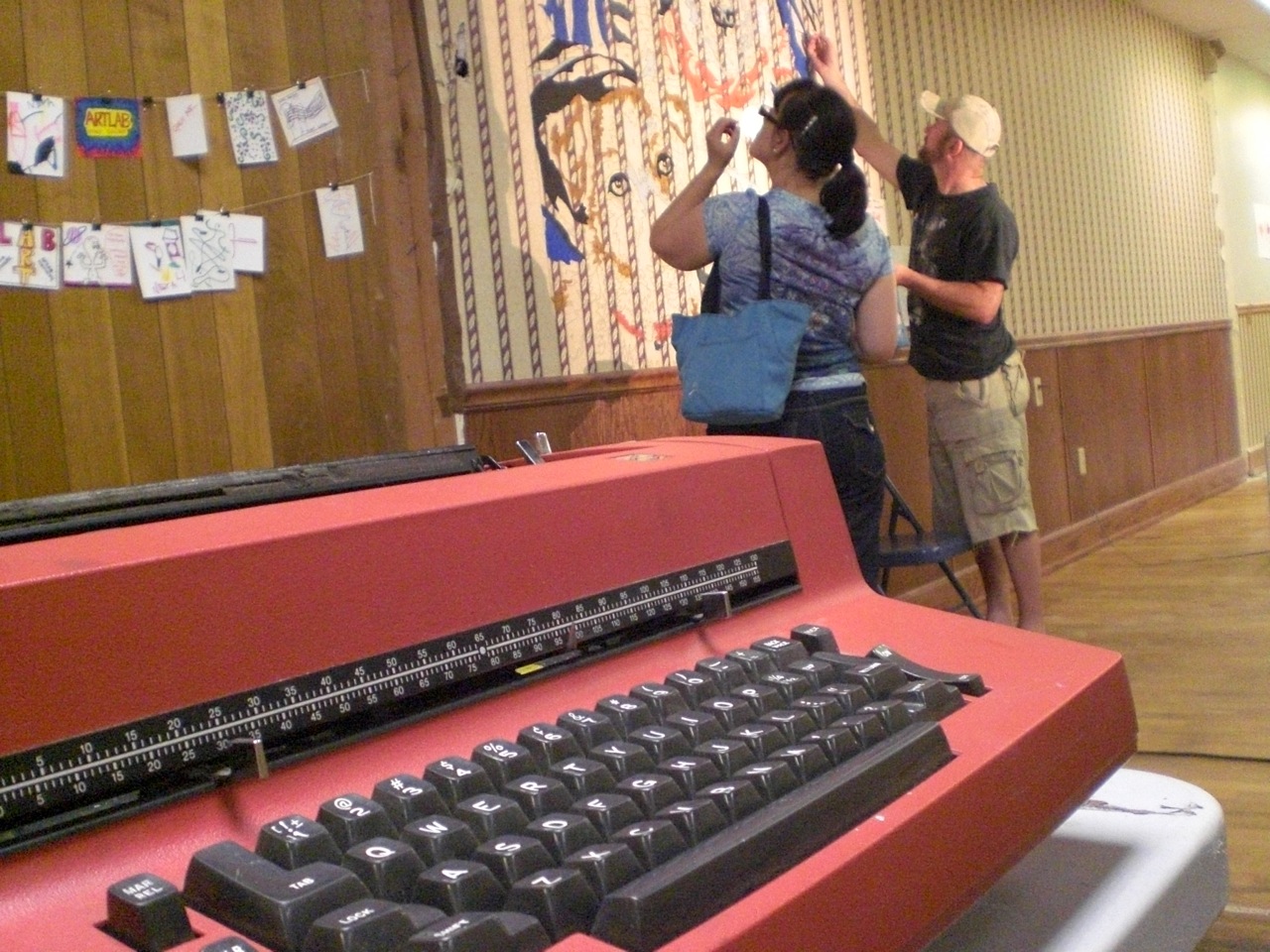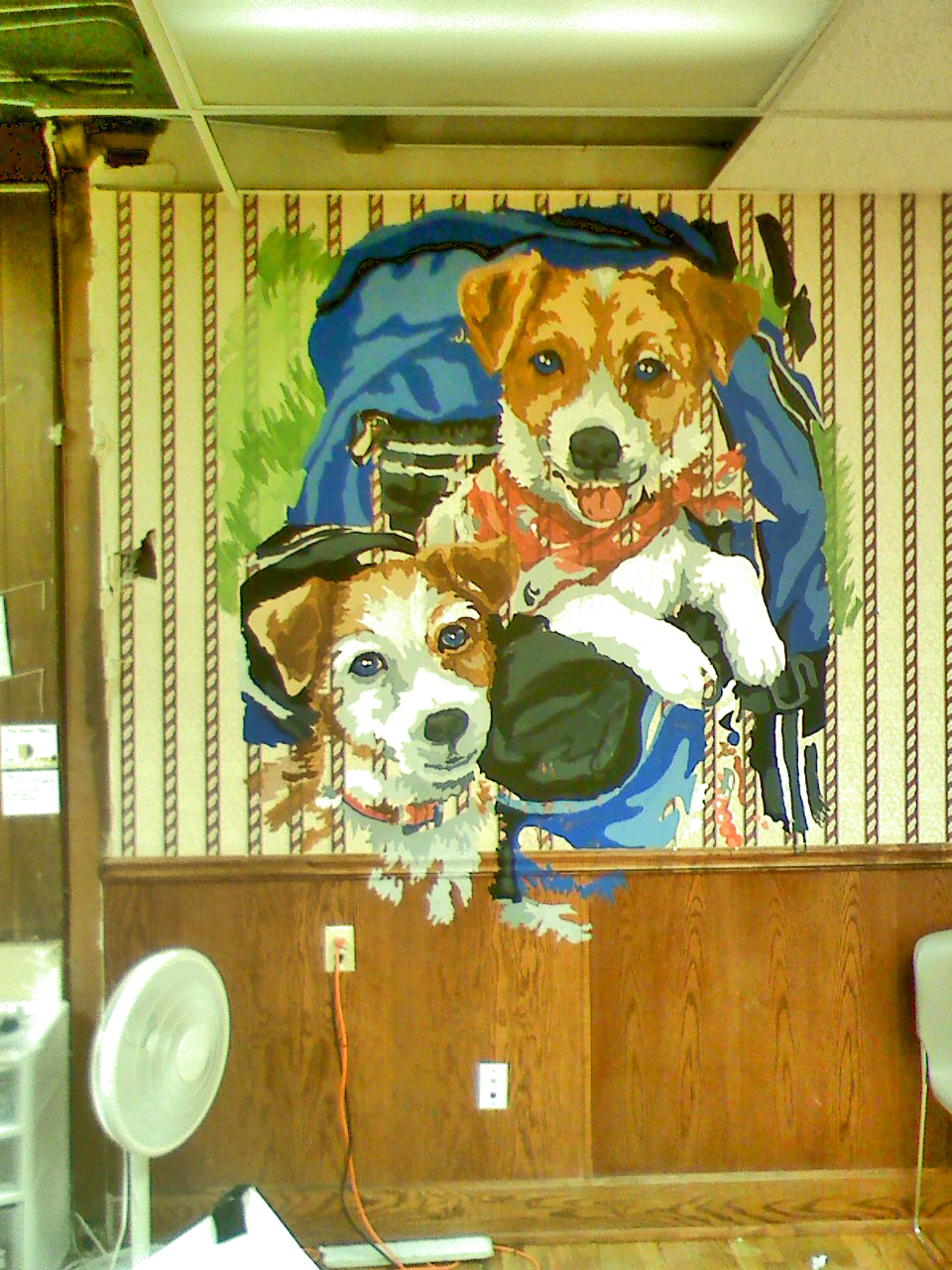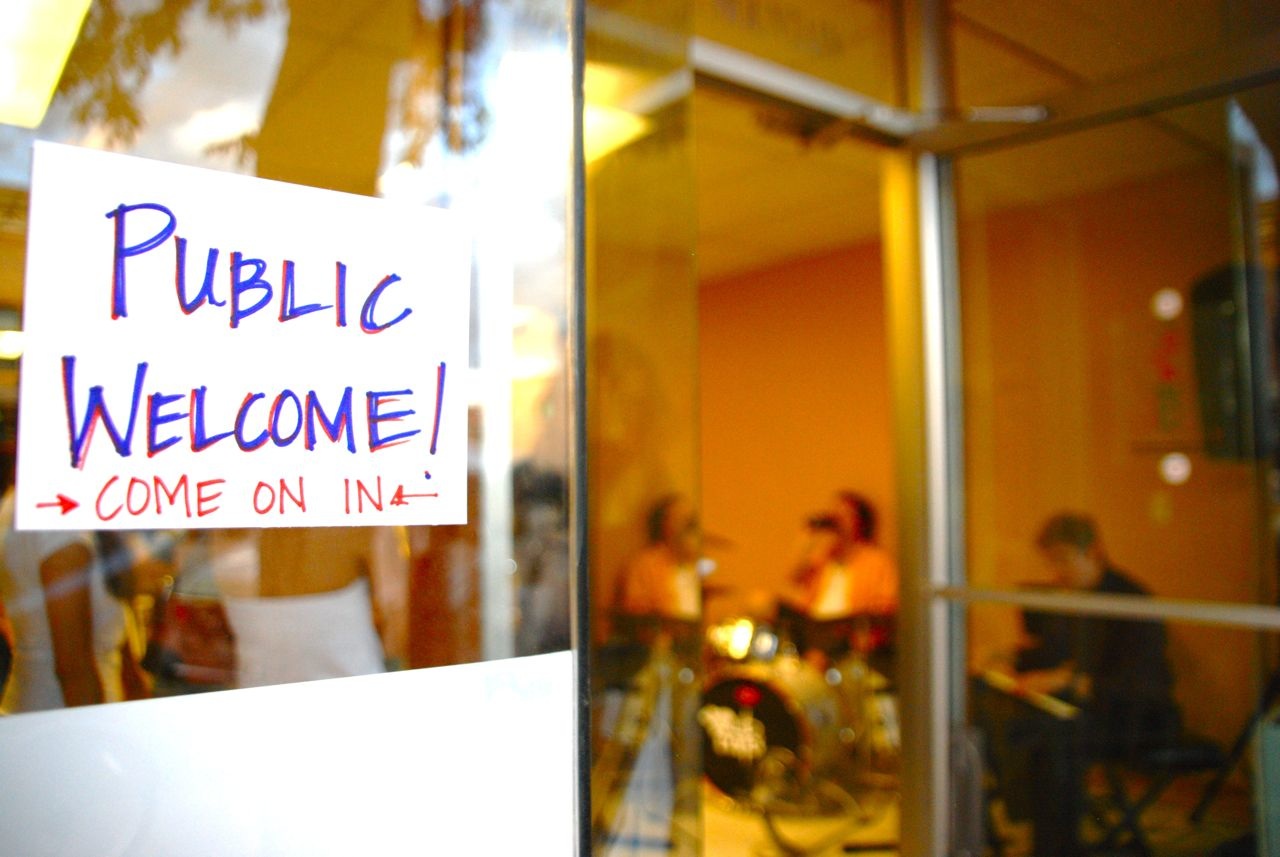Art Lab, a grand creative experiment
Art Lab started in 2009 with a simple question: Could a small group of creatives turn vacant storefronts into vibrant art spaces? Dawn Putney and Tom Campbell, owners of branding firm Toolbox Creative, were inspired by seeing similar concepts in big cities and spearheaded a group of like-minded creative entrepreneurs to explore the idea of creating such spaces in Fort Collins, Colorado. A bit of luck, good timing and a conversation with Steve Taylor of Hot Corner Concepts led to the first physical Art Lab space at 140 West Mountain in Old Town Fort Collins.
A former law office, the space was slated to become the next restaurant from the owners of Austins, Big Al’s Burgers and Dogs, and The Moot House. Hot Corner Concepts had plans to start construction in a few months. In the meantime, Art Lab would have its first home.

A clean slate and a dirty job — Art Lab is born
The Art Lab experiment began
Putney looks back fondly on those early days: “I think we were able to pull it off because we didn’t overthink it. If we had conducted a feasibility study, we likely would have spent tens of thousands of somebody’s dollars on the the study, only to determine Art Lab would not be feasible. Instead, we just moved ahead and figured it out as we went along.” She notes that Art Lab is a 501(c)(6) organization that runs lean and mean with no board of directors, little revenue and few expenses. The first Art Lab space was immediately well-received, hosting interactive art and music events and taking advantage of the unique setting. “We knew they’d be completely demolishing the place, so we were able to have some fun in the space,” Campbell remembers. “There was this really nasty ’80s wallpaper, so we projected a giant paint-by-numbers puppy on to the wall and people could paint a little section when they visited the space. It was fun to see it come to life over time.”

Just a half block off of the bustling intersection of College and Mountain in the heart of Old Town Fort Collins, Art Lab drew a good crowd of curious walk-ins, particularly during the established First Friday art walks.
“The thinking was, we’d occupy spaces, get people in there and hopefully help find a tenant for the owner.”
Inspired by pop-up retail and art spaces, the initial concept was to temporarily take over a vacant space, rent-free, and turn it into something more appealing. Based on the premise that it’s easier to rent or sell an occupied space than a vacant space, Art Lab would transform the space, and building owners would benefit from lower insurance costs, increased traffic and an overall improved neighborhood.
“It’s hard to imagine now, but when we started Art Lab, there were 13 vacant storefronts right in the heart of Old Town,” Putney remembers. “The thinking was, we’d occupy spaces, get people in there and hopefully help find a tenant for the owner.”

Art Lab thrived in the Mountain Avenue space for about six months and connected local artists with the community. The short-lived but much-loved house band Art Lab Rats was formed, and most importantly, the concept proved it could work. In went Big Al’s Burgers and Dogs (a delicious use of the space), and Art Lab was ready to move on.
The serendipity kept flowing
Unbeknownst to the Art Lab team, the co-owners of the Mountain Street space took a liking to the concept. “Before we started looking for our next space, the building owners reached out and said they had a new space for us,” Campbell recalls. “We moved from Mountain Avenue into the old Repeat Boutique space next to Cozzola’s on Linden Street over a weekend and did not miss a beat.”
Even closer to the heart of activity in Old Town, Art Lab prepared for a short but fruitful residency on Linden Street. “Our understanding was that we’d inhabit the space temporarily and move on when a new tenant arrived. We had even better walk-in traffic, especially on First Fridays, and knew this was a hot location that would rent quickly,” Putney recollects with a glint in her eyes. “Eventually Patty Spencer, the real estate agent for the space, called us and told us to take her sign down.” Puzzled, Putney pressed Spencer for an explanation. “Basically she said anytime someone inquired about renting the space, the owners said they weren’t interested. So we’ve been temporary tenants for seven years.” Putney’s glint broadens to a smile. “We’re incredibly grateful to have such a generous and supportive landlord, and we’re thrilled to be here as long as they’ll have us,” adds Campbell.
“We’re incredibly grateful to have such a generous and supportive landlord, and we’re thrilled to be here as long as they’ll have us”
In the eight years Art Lab has been on Linden Street, the neighborhood and the creative community at large has seen lots of progress. While some traditional galleries and other progressive art spaces like GNU and Opiate have come and gone, Putney sees Art Lab as a catalyst for advancing the creative class: “The neighborhood is buzzing. We’ve got the Downtown Artery and The Articulate for visual artists across the street and the Music District for musicians down the road.” While the thin-walled Art Lab was never an ideal music venue, in the early days it offered rehearsal and performance space for musicians when there was no space available. “We’re so happy to be able to refer bands to rehearsal spaces, and I know the folks at Cozzola’s are happy, too.” Campbell laughs.
Art Lab differs significantly from other arts venues. Artists are not curated or juried, pay no commission and can pay to use the space in flexible and creative ways, like cleaning the bathroom, painting or contributing a portion of sales. “We don’t judge who uses the space based on their work. We have, however, learned the hard way to first make sure that people understand the concept and want to leave the space better than they found it,” Campbell clarifies, adding animatedly, “Art Lab runs on a basic rising tide philosophy. If you want to make the space in particular and the creative community at large better than you found it, great — welcome to Art Lab. If you think the world owes you something, then good day to you — we’re not your spot.”
As with all experiments, this policy was developed through much trial and error. “The closest I’ve come to a non-hockey fist fight in my adult life has been at Art Lab dealing with an angry person who thought we were somehow exploiting his wife by showing her art commission-free,” says Campbell with a grin. “Art is a rough and tumble business.”
All volunteer-run with no paid staff, Art Lab has benefitted greatly from interns provided by Larimer County Workforce. “It’s truly a win-win,” Putney explains. “We get much-needed help, Workforce pays them and our interns get good, real-world work experience.”
The creative movement expanded
Now in its ninth season, this little creative experiment is stronger than ever, extending beyond the walls of Art Lab. Launched as a beta test in the summer of 2016, Pop Up Art Carts has become a movement all its own. “Working with Art Lab over the years, we identified a lot of impediments to success for local artists,” Putney shares. “Whether it was lack of space to show their work, inexperience talking about their work, lack of exposure or something as basic as collecting and remitting taxes, we met a lot of great artists who for one reason or another struggled to find commercial success.”
Campbell chimes in, “We also noticed that as many visitors as we have, there is a portion of the community, both locals and tourists, who just don’t come into art spaces.” Buying art can be as intimidating as selling art, so the Pop Up Art Carts concept was designed to take art to the streets, connect artists directly with potential buyers and work to break down the barriers to sale.
With support from the Fort Collins Downtown Development Authority, Pop Up Art Carts bring local artists and their handmade, people-powered carts to Old Town Square, the bustling heart of cultural and tourist activity in Fort Collins, to create, show and sell their wares directly to the public, commission-free and as hassle-free as possible.
Like Art Lab, Pop Up Art Cart artists, or “cartists” as they’re known, are not curated or juried. The concept is refreshingly free-market for an arts organization. Mixing established artist like Amelia Caruso and Elizabeth Morisette with up-and-coming artists like Jess Wawiorka and Melody Sue Kienitz, the market determines what will sell and what won’t.
“I like to think of myself as having impeccable taste in art,” Campbell jokes. But the Pop Up Art Carts experiment has been humbling. “One of my favorite things about Art Lab is we’ve hosted successful artists and shows that I never would have chosen, had I been a juror or curator. The Art of the Bicycle was a perfect example,” he chuckles.

“Likewise, we’ve had shows I loved that did not sell. Goes to show what I know.”
With over 50 cartists involved, the Fort Collins creative community is using this unique opportunity to help find commercial success. Local artist and Pop Up Art Carts “senior class president” Amelia Caruso preaches the good word. “Artists need to understand what an amazing opportunity they have here and take full advantage of it,” she says, gesticulating wildly. “Look, you can sit out in the beautiful weather with your friends, paint for three hours, have thousands of people walk past and see your work. That’s the kind of exposure you can’t pay for. And you’re not paying to be there.”
Meeting the artist and watching them create their work in real time makes an intimate personal connection you can’t get in a gallery setting. Caruso offers advice for fellow cartists, “Talk to people and hand out some cards. You might not make the sale that day, but they’re now likely to come back with a commission or be interested in buying a piece.”
While sales have been good, eclipsing 2016’s sales on the first day of the 2017 season, cartists benefit in other ways beyond sales. One-time cartist Marge Corcoran went out once, did not sell anything, but did meet a lot of people and as a direct result, got picked up by a local gallery.
“It started as one big experiment, and it continues to be an experiment.”
While an Art Lab in neighboring Loveland thrived for a few years, the model has yet to establish a hold in other communities. “We get calls all the time from cities wanting to create similar spaces,” Putney explains. “The thing about an organic experiment like Art Lab is you can’t easily replicate it. We can’t tell them exactly how to do it. They need private champions, building owners who want to improve the community even when it does not make immediate, bottom line sense, a community that will support it and bureaucracy that will champion it without getting too involved. We have a pretty special convergence of those elements here in Fort Collins.” Putney beams.
The future is as bright as it is uncertain for Art Lab, and Putney and Campbell wouldn’t want it any other way. “The space could go away tomorrow. Art Carts could go away tomorrow, or they could go on another eight years and turn into something completely different,” Campbell muses. “That’s the exciting thing,” Putney adds. “It started as one big experiment, and it continues to be an experiment.”
While Putney and Campbell embrace the ephemeral nature of their experiment, Art Lab as a movement, as a way of thinking, as a vehicle for connecting creatives and the community, has become an immovable force in Fort Collins and isn’t going away any time soon.